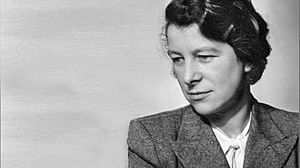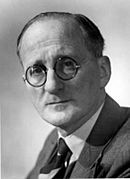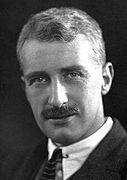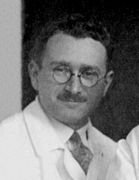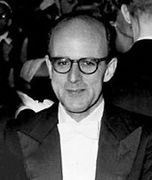Esther Simpson facts for kids
Esther Simpson OBE (born July 31, 1903 – died November 19, 1996) was a British humanitarian. A humanitarian is someone who works to improve the lives of others. She was the Assistant Secretary, and later Secretary, of the Academic Assistance Council (AAC). She worked for this group and its later names from 1933 until 1978.
Esther worked very hard to find jobs and connections for academics who had to leave their homes. These were often scientists and thinkers escaping danger. She helped many famous minds fleeing persecution. Her work was a mix of kindness and strength.
During World War II, she helped many refugees. Among them were 16 future Nobel Prize winners. Also, 74 future Fellows of the Royal Society and 34 future Fellows of the British Academy were helped by her. She once said her work was like an "academic version" of the kindertransport program. This program saved thousands of Jewish children from Nazi Germany.
She received the OBE award in 1956. This is a special honor from the British King or Queen. She also got honorary degrees from the University of London and the University of Leeds.
Esther Simpson was known as Tess to her friends. She was famous for being a dedicated helper and organizer for the Academic Assistance Council. She worked with people like Leo Szilard, a famous scientist. She helped hundreds of refugee academics during and after World War II. She found them jobs all over the world. She worked with many groups to help refugees. This was especially important during the Nazi regime and other global conflicts.
Contents
Her Early Life
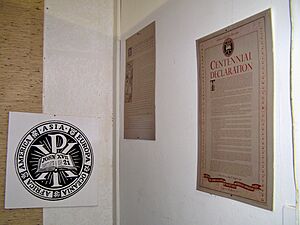
Esther Simpson was born Esther Sinovitch on July 31, 1903. She was born in Leeds, Yorkshire, England. Her parents were Jewish immigrants from Russia. They moved to Leeds to escape violence against Jewish people called pogroms.
Esther was the youngest of four children. Her family was lower-middle-class. Her father worked in a clothing factory. She went to the Leeds Girls' Modern School. Then, she studied at the University of Leeds from 1921 to 1925. She earned a scholarship and got a top degree in Modern Languages. Esther was fluent in German and French, as well as English.
After college, she worked in Europe. First, she was a governess in Germany. Then, she worked briefly in Paris. In 1928, she got a job in Vienna. She worked there for a few years. In 1933, she started working for the World Alliance of the YMCA in Geneva.
In July 1933, she took a job in London. It paid less money. This job was with the Academic Assistance Council (AAC). She believed she could make a real difference there. The AAC later changed its name to the Society for Protection of Science and Learning, and then Cara.
A Life Dedicated to Helping Others
Esther Simpson changed her last name from Sinovitch on August 21, 1933. This was one month after she started helping people whose names sounded foreign to Britons.
Esther loved her work very much. She never married or had children. Her friends remember her as someone who cared deeply about all people. She was a member of the Society of Friends. She understood how important it was to help scholars who were refugees. She was known as Miss Simpson to strangers, Esther to co-workers, and Tess to her close friends. She felt her background as a child of immigrants helped her in her work. She knew refugee groups couldn't do everything, but she wanted to help as much as she could.
Esther's lifelong passion was music. She was a very talented violinist. She started violin lessons when she was nine. She won awards and medals for her violin playing. She became a very skilled amateur musician. Some professional musicians enjoyed playing with her. She said music gave her wonderful friends.
Starting the Academic Assistance Council
In the summer of 1933, Esther was hired by the Academic Assistance Council (AAC). She became an assistant secretary. Later, she became the administrator and executive assistant. The AAC was created to help academics escaping the Nazi regime. It offered them money and helped them find new jobs around the world.
The AAC had an office in London. It was set up by William Beveridge and Ludwig von Mises . There were only two employees: the Secretary, Walter Adam, and Esther as Assistant Secretary. This meant Esther did most of the charity's work. She organized support for refugees. She also worked to help people of German or Austrian origin who were now in Britain. Many of these people had valuable skills. In 1940, Esther made a list of over 550 scholars. These scholars were being held by the British government. She worked to get them released.
Helping During and After the War
When World War II began in 1939, Esther had registered about 2,000 scholars. By the 1940s, the AAC was renamed the Society for the Protection of Science and Learning (SPSL). Esther was a leading figure in this group. They helped refugee scholars who were held by the British government. They also continued to help those fleeing Nazi Germany.
Otto Neurath, a leading language scientist, was briefly held in Britain. It was Esther and her work that helped him get released in 1941. He then continued his research at the University of Oxford.
Esther was key in processing the application forms the SPSL received. These forms asked for personal details, income, and skills. Esther decided who to support. She got references and tried to place scholars in jobs. Most jobs were in the UK, the Commonwealth, and the USA. She helped refugees move to their new homes. She also arranged and funded lecture tours to the United States. Often, scholars were offered jobs right after these tours.
It was harder to find jobs for academics in some fields. These included law, history, and art history. These subjects are often specific to one country. However, some art historians found jobs as curators. Science fields had more job openings. It was also harder to place German scholars. Their German education was sometimes less preferred than a British one.
Esther was very dedicated to her job. She worked long hours, often late into the evenings. Even at the start, she earned much less than before. She believed there was no time for holidays. Her first holiday since starting with the Society was in 1951. She was essential in the daily work of the organization. Esther was also vital in talking with refugee scholars. She wrote tens of thousands of letters during her time there.
After the war ended, Esther continued her work. She helped find scholars who had not escaped. This meant helping survivors find new homes. She also told friends and family about those who did not survive. She worked hard to reunite academics with their families. She thought of the people she helped as her own family.
In 1944, Esther left the SPSL for a job at the Society for Visiting Scientists. She worked there until it closed in 1966. But from 1951, she also volunteered for the SPSL. This group kept helping persecuted academics. In 1966, she rejoined the SPSL full-time. A colleague wrote that "intolerance went on" even after Hitler died. The groups helped refugees fleeing from Eastern Europe and the Stalinist regime in the USSR. They also helped those escaping regimes in South Africa, Chile, and Argentina.
"Esther's Children" - Her Amazing Impact
Throughout her life, Esther Simpson helped save hundreds of lives. These included scientists, philosophers, historians, artists, musicians, and architects. They went on to contribute greatly to intellectual and cultural life worldwide.
In 1983, Esther made a list of all the refugee scholars and their children. These were people saved by the SPSL who had achieved great things. The list included 16 Nobel Prize winners. It also had 80 fellows of the Royal Society and 34 fellows of the British Academy. Many others, without special awards, still added a lot to knowledge and culture. They worked in Britain, the United States, and other parts of the world.
- Some of Esther's Children
She became friends with many of her "children." This included the famous violinist Max Rostal. She was the only amateur he ever taught. She often had dinner with Nikolaus Pevsner. He helped people see UK's architecture in new ways. A.V. Hill, a Nobel Prize winner, wrote to Tess for 40 years. Also, Ludwig Guttmann, who started the Paralympics, and Max Perutz, a Nobel laureate in biology, wrote to her.
Esther also became a close friend of Engelbert Broda. He was an Austrian chemist. Their letters were less formal than with other scholars. They stayed friends even though Broda was a communist.
The scholars she saved cared deeply for her. At her retirement party in 1966, many important people attended. Money was collected for Esther. She had worked for a small salary and had no savings. They raised enough money to buy her a flat in Belsize Park, London. Letters of thanks and love came from all over the world. She continued to run the SPSL from this flat.
Until her death, Esther Simpson walked to the local shop every day. She bought a newspaper and The Times. She would cut out articles about the work her "children" were doing.
Awards and Recognition
In 1949, the French government gave her the Ordre des Palmes Académiques. She became an Officer d'Académie. Then, she received the Officer of the Order of the British Empire (OBE) in 1956. She also got an honorary law degree (LLD) from the University of London in 1981. In 1989, she received another from her old university, the University of Leeds. In 1991, she became an honorary member of the Royal College of Physicians in Britain. The Registrar said she was a very deserving person.
Her Lasting Legacy
Esther Simpson kept playing music, especially the violin and viola. She played until her hearing got worse in her seventies.
In 1992, Esther worked with Ray Cooper on a book. It was called "Refugee Scholars: Conversations with Tess Simpson." It was an informal story of her life. Max Perutz and Sir Ernst Gombrich helped and attended her book launch.
She passed away on November 19, 1996, at age 93. She gave all her letters and documents to the University of Leeds Archives. In her will, she left her flat to the SPSL.
In January 2020, the University of Leeds announced a new building. It would be shared by the Business School and Law School. It was named the Esther Simpson Building. On March 8, 2022, a blue plaque was put on the building. This plaque honors Esther Simpson's memory.
 | James Van Der Zee |
 | Alma Thomas |
 | Ellis Wilson |
 | Margaret Taylor-Burroughs |


